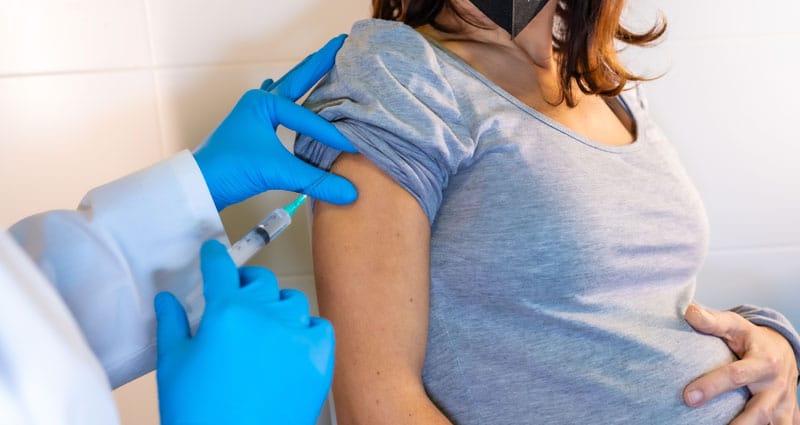Expecting a baby can be an incredible season of your life, but during a pandemic there’s an added element of uncertainty at a time when staying healthy is doubly important.
Rebecca Curran, MD, PhD, family medicine doctor and epidemiologist with Lourdes Physician Group, fills us in on what we know now about pregnancy and COVID-19, specifically that it is safe and recommended that all expecting moms get vaccinated. The pros outweigh the cons for pregnant women to receive the initial two-shot series of Pfizer-BioNTech or Moderna, and vaccination is safe.
COVID-19 Vaccines Are Safe in Pregnancy
There are two big reasons to support that recommendation. The first is that pregnancy itself puts expectant moms at high risk for COVID-19 complications. Unfortunately, we’ve seen women who were infected with COVID-19 during pregnancy have a much higher risk of preterm birth, stillbirth and pre-eclampsia, a condition characterized by high blood pressure.
When you’re growing a baby inside you, your lungs are more vulnerable, especially later in pregnancy when the baby crowds your lungs, and COVID-19 is a respiratory disease. While your body is growing a baby, your immune system is not as active as it usually is, and you’re more vulnerable to infection in general.
Secondly, some of a mom’s protection from COVID-19 vaccination is passed onto her baby through antibodies via the placenta, offering some protection in those first few months of life when babies are particularly vulnerable to infection. Antibodies are also passed via breastmilk, but more research is needed to say for sure how much passive immunity protection against COVID-19 that may provide.
What About Boosters?
The decision whether a fully vaccinated expecting mom should get a booster shot is best made after conversation with her provider about individual risks and benefits. The one exception is if her original vaccine was Johnson & Johnson. All adults 18+ whose first vaccine was Johnson & Johnson should get a booster, including pregnant people. Read more about COVID-19 boosters.
Other Ways to Protect Mom and Baby
Statistically, vaccines are the best tool to reduce risk of COVID-19 infection, and everyone around an expecting mom should get vaccinated when eligible to help protect her and her baby.
Contact with other people always comes with the risk of catching an infection, and we know pregnant moms want to do all they can to reduce that risk. But remember, it’s not healthy to be completely isolated from others for long periods of time, and moms-to-be need the support of the people around them! Continue COVID-smart precautions, such as masking, physical distancing and, when you can, choosing to meet outdoors rather than indoors.
Luckily in south Louisiana and Mississippi the season in which respiratory diseases tend to spread also coincides with some of our best weather. We’re blessed to be able to move a lot of events like baby showers outdoors and enjoy other people’s company in safer ways. However, it’s worth considering if being in big crowds is worth the risk.
Masking when you’re pregnant and around people outside of your own household indoors is critical whether you’re vaccinated or not. You may even want to mask up around your other children if they are sick if your family structure allows. It may also be a time to call in reinforcements to help care for other children if they get sick.
Airflow is an important consideration; maybe even more important than the physical space you maintain between yourself and others. If you must be with others inside, crack a window or have an air purifier going – anything to keep the air moving.
Don’t Forget About Flu
Getting a seasonal flu shot is another important way pregnant moms can protect themselves and their babies. Those around them should also be sure to get vaccinated against the flu. Anyone who’s going to be around a pregnant person regularly should protect her and her baby by getting their COVID-19 and flu shots.
Keep Up with Prenatal Care
Our goal is always a healthy pregnancy. In-person visits are a critical part of that, especially for blood pressure monitoring and checking baby’s heart rate. So, while your instinct might be to hunker down for the duration, there is balance and you still need to live your life, maintain your prenatal visits, and keep building the village who will help you raise your bundle of joy.
What to Do If You Are Pregnant and Test Positive for COVID-19
It’s particularly critical for pregnant women to get tested if they have any symptoms of COVID-19 or if they are exposed, which might mean frequent testing. Federally funded testing is still available at some pharmacies. Learn about testing availability in Louisiana here and at St. Dominic’s in Jackson, Miss, here.
If an expecting mom tests positive for COVID-19, Dr. Curran strongly recommends that she get monoclonal antibody therapy. The sooner she can get it the better. Learn more about this therapy that significantly cuts down on the risk that a COVID-19 infection will progress to serious illness.
Vaccination is a medical decision, but during pregnancy, it’s also a parenting decision. Be sure to speak with your doctor to make the right choices for your health.




